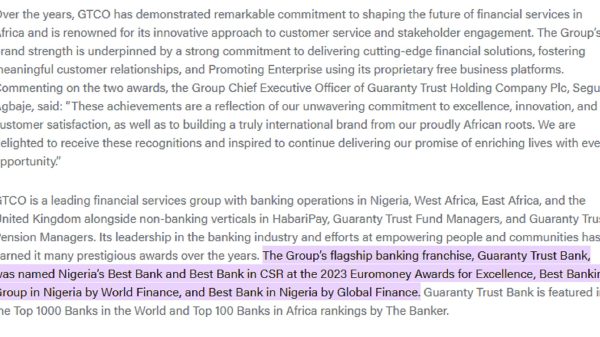The Central Bank of Nigeria (CBN) released its “Bullion” first quarter publication. A segment of the publication, which spoke about the “Relationship between Stock Prices and Economic Growth in Nigeria” looked into the causal relationship between stock prices and economic growth in Nigeria from 1986 to 2018.
CBN stated that there is a need for capital market regulators to refocus their lens to address the efficiency of the market and reduce information irregularities. More technological communication interface should be developed for the use of market participants. The casual independence between the stock price and economic growth is a pointer to the fact that the Nigerian stock market has not been efficiently integrated into the economy.
This implies that the stock price and economic growth are independent of each other as a change in the behaviour of one may not necessarily cause a change in the behaviour of the other.
This is because such independence between stock price and economic growth means that economic activity has not yet translated into improvements in the value of the market, and vice versa.
The result of the analysis stated the following:
• Trend analysis concluded that stock prices and other stock market variables especially stock turnover ratio, were more volatile than economic growth as they rose and fell sharply in contrast to the steady and relatively stable rising movements of Gross Domestic Product (GDP).
• The short-run estimates concluded that stock prices had no significant effect on economic growth in the short run; although other independent variables such as government expenditure, market capitalization and credit to private sector showed a positive and significant effect on economic growth in the short run.
• The long-run estimates concluded that stock price and credit to private sector had a significant and positive effect on economic growth in the long run while other variables showed no such effect. The report concluded that an increase in stock prices would lead to an increase in economic growth by 38.44%.
• The Granger Pairwise Causality test concluded that stock prices have no causal relationship with economic growth.
This implies that the stock price and economic growth are independent of each other as a change in the behaviour of one may not necessarily cause a change in the behaviour of the other.
The methodologies used for this research work are the OLS (Ordinary Least Square) which can be used to determine the relationship between the given variables, ARDL (Autoregressive Distributed Lag) which is an OLS based model that takes sufficient numbers of lags to capture the data generating process in a general-to-specific modelling framework, and the Granger Pairwise Causality which shows the pairwise relationship, which may be one-way or two-way relationship or no relationship.
A total of 7 variables were used for the report which includes: Gross Domestic Product (GDP), Stock Price (SP), Government Expenditure (GEXP), Market Capitalization (MCAP), Number of Transactions, Credit to Private Sector (CPS) and Stock Turnover Ratio.
What this means
The report ultimately concluded that stock prices had a positive and significant relationship with economic growth in the long run. This means that the Nigerian stock market and the Nigerian economy will ultimately move in the same direction in the long run.
Although the results proved a positive relationship in the long-run, it showed that there was no causal relationship between stock prices and economic growth.
The Nigerian stock market’s All Share Index (ASI) is currently down 6.64% Year to Date (YtD) while the GDP of the first quarter of 2021 grew marginally by 0.51%. This is consistent with the Granger Pairwise Causality test which concluded that stock prices and economic growth have no causal relationship. Considering the ASI and GDP performance from the 2008 stock market crash to 2020, we can see that the ASI has a significant and positive effect on GDP which is consistent with the long-run conclusion. The ASI grew 28.04% while the GDP grew 51.15%.
The report stated:
“Premised on the reduction of the treasury bill rate, which is gradually far below the inflation rate and inching towards zero per cent, it is recommended that the attention of the investing public may be diverted to the capital market. Furthermore, a stronger user interface is recommended in addition to CAPNET to reduce information asymmetries.”
The analysis was done by Olumide B. Tokoya and Adekunle S. Adekeye, who are members of the statistics department of the CBN.

















































You must be logged in to post a comment Login